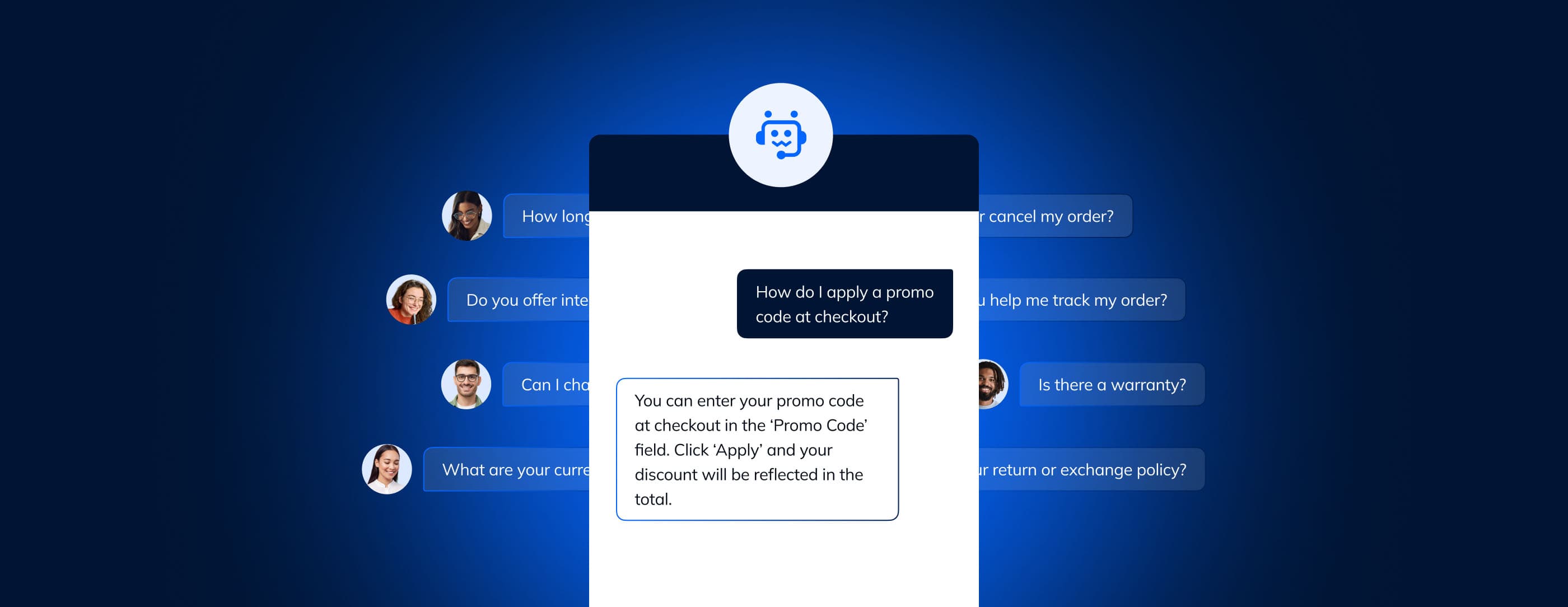Chatbot platform is computer software that uses special algorithms or artificial intelligence (AI) to conduct conversations with people via text or voice input. Most providers offer tools for developing and customizing chatbots suited for a specific customer base.
How do they work?
Chatbot platforms help businesses create customized chatbots, often through intuitive, no-code interfaces with drag-and-drop tools. These systems enable easy integration with CRMs, websites, or apps.
Moreover, chatbots follow a predefined conversational flow, process user input using NLP, retrieve relevant information via Retrieval-Augmented Generation (RAG), and deliver appropriate responses.
Enough of the technicalities, let’s jump into the list of the top chatbot platforms for your business.
Skip all the reading and install Tidio in 3 minutes
Rule-based vs AI chatbot platforms
Here’s a comparison table of simple chat flows vs AI agents:
| Rule-based | AI-powered | |
| Description | Operates using predefined rules and scripts, delivering responses based on established patterns | Leverages machine learning and natural language processing to interpret and respond to user input |
| Advantages | Delivers consistent and predictable replies Straightforward to set up and maintain | Understands and interacts in natural language Continuously learns and evolves to enhance performance |
| Use cases | Ideal for frequently asked questions Handles basic customer support inquiries effectively Useful for proactively offering product discounts | Delivers tailored customer support experiences Draws on detailed product knowledge Effectively handles complex or nuanced customer queries |
Read more: Download the free ebook on how you can improve your ecommerce business using rule-based and AI chatbots.
Best chatbot platforms review
Installing an AI chatbot on your website is a small step for you, but a giant leap for your customers. These systems provide quick answers to your website visitors, engage customers with a welcome message, book appointments, offer discounts, or even gauge customer satisfaction.
Not to mention that chatbot platforms like Tidio provide web analytics to help you understand patterns in consumer behavior. So, let’s go through the best AI software available on the market.
Here’s a chatbot platforms comparison table for a quick weigh out of all providers:
Chatbot platforms: key feature overview table
| Name | Rating | Free plan | Best for | Main features |
|---|---|---|---|---|
| Tidio | 4.7/5 ⭐️ | ✅ | Small to medium businesses | Easy installation and many triggers for bots |
| MobileMonkey | 4.8/5 ⭐️ | ✅ | Omnichannel marketers | Visual campaign builder |
| Chatfuel | 4.4/5 ⭐️ | ✅ | Messenger | Seamless integration with Shopify, Zapier, etc. |
| ManyChat | 4.5/5 ⭐️ | ✅ | Social media integration | Payments on the chatbot |
| Aivo | 4.5/5 ⭐️ | Free 30-day trial | Startups | Video and interactive content |
| Dialogflow | 4.4/5 ⭐️ | Free trial | Companies working on Google Cloud | Google AI |
| Imperson | No reviews available | ❌ | Big to enterprise businesses | Deep dialogue context technology |
| Octane AI | 4.2/5 ⭐️ | Free 14-day trial | Ecommerce Messenger/SMS campaigns for Shopify stores | Survey/poll management |
Genesys DX (formerly Bold360) | 4.4/5 ⭐️ | ❌ | Embedding chatbots to iOS and Android app | SDK tool to embed chats to iOS and Android apps |
| Drift chatbot | 4.4/5 ⭐️ | ✅ | B2B companies | Account-based marketing feature |
1. Tidio
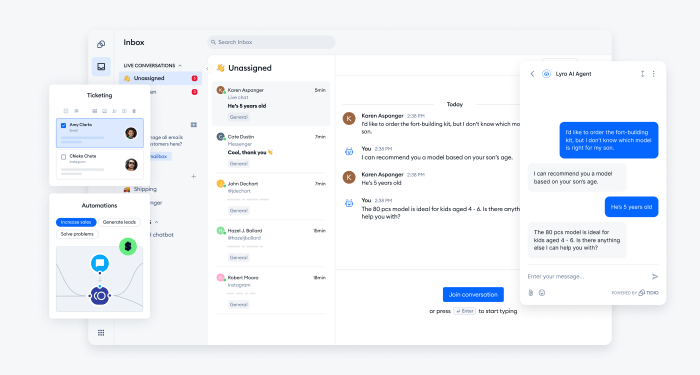
Ratings: 4.7/5 ⭐️ (1,760+ reviews on G2)
Tidio offers a live chat solution with chatbots to help you improve customer support. It also provides a live view feature to let you see who’s currently on your website so you can provide proactive customer service.
This chatbot platform provides a conversational AI chatbot and NLP (Natural Language Processing) to help you with customer experience. You can also use a visual builder interface and Tidio chatbot templates when building your bot to see it grow with every input you make.
But let’s not brag about how great we are. You can check out Tidio reviews and test our product for free to judge the quality for yourself.
Main features:
- Easy installation under 5 minutes
- Visual builder interface
- 16 different triggers for Tidio bots
- Free live chat on a mobile phone for reaching your customers on the go
NLP chatbots available - AI copilot for customer service
- Variety of integrations (MailChimp, Zapier, etc.)
Pricing:
- 7-day free trial available
- Free version available
- Starter ($24.17/mo)
- Growth (starts at $49.17/mo)
- Plus (starts at $749/mo)
- Premium (starts at $2999/mo)
Read more: Learn how to install Tidio on your website in just a few minutes. Also, explore the benefits, use cases, and best practices of integrating AI chatbots for your needs.
Get the newest AI chatbot and put customer experience on autopilot
2. Customers.ai (previously MobileMonkey)
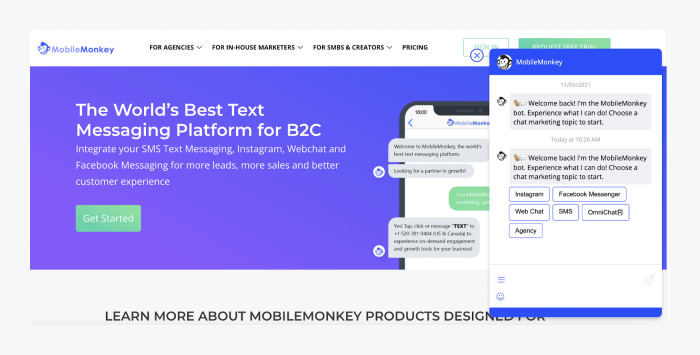
Ratings: 4.8/5 ⭐️ (420+ reviews on G2)
This chatbot provider is an omnichannel platform that lets you integrate SMS messaging, Instagram, Facebook, and Webchat for better customer service.
It is the best chatbot platform that is designed to help businesses stay in touch with their customers and attract new leads from social media. It lets you automate follow-ups to improve customer care.
You can export existing contacts to this bot platform effortlessly. You can also contact leads, conduct drip campaigns, share links, and schedule messages. This way, campaigns become convenient, and you can send them in batches of SMS in advance.
Pros:
- Multi-platform chatbot builder
- Keyword recognition
- Visual campaign builder
Cons:
- Cannot use conditions in chatbot flows
- Not possible to use AI
- No ecommerce integration
Pricing:
- Free version available
- Shopify Intro ($99/mo)
- Shopify Starter ($199/mo)
- Shopify Pro ($399/mo)
- Shopify Advanced ($799/mo)
3. Chatfuel
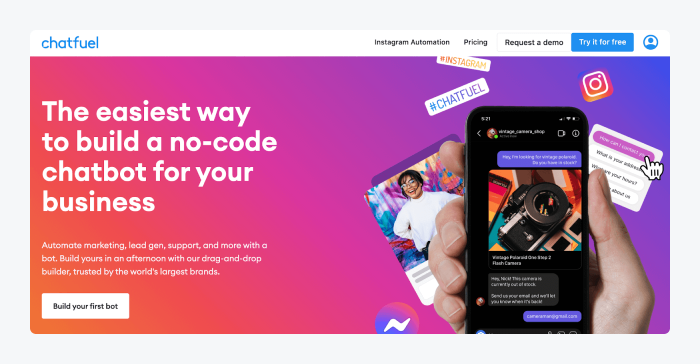
Ratings: 4.4/5 ⭐️ (45+ reviews on G2)
If you need an easy-to-use bot for your Facebook Messenger and Instagram customer support, then this chatbot provider is just for you.
You get plenty of documentation and step-by-step instructions for building your chatbots. Chatfuel has a straightforward interface, so even beginners can easily make and deploy bots. You can use the content blocks, which are sections of content for an even quicker building of your bot.
This conversational chatbot platform offers seamless third-party integration with ecommerce platforms such as Shopify, automation platforms such as Zapier or its alternatives, and many more. So your bot is and does exactly what your business needs.
Pros:
- Good analytics
- Straight-forward interface
- Many third-party integrations, such as Zapier, Shopify, etc
Cons:
- No AI available
- Only available on Facebook Messenger and Instagram
Pricing:
- Free plan available
- Business Facebook & Instagram($23.99/mo)
- Business WhatsApp ($34.49/mo)
- Enterprise ($300/mo)
4. ManyChat
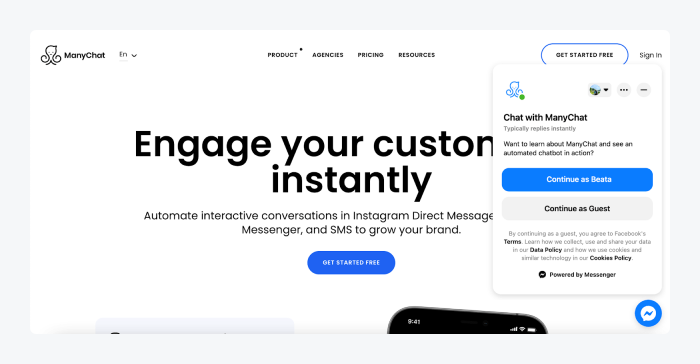
Ratings: 4.5/5 ⭐️ (150+ reviews on G2)
This is one of the top chatbot platforms for your social media business account. These are rule-based chatbots that you can use to capture contact information, interact with customers, or pause the automation feature to transfer the communication to the agent.
ManyChat is a cloud-based chatbot solution for chat marketing campaigns through social media platforms and text messaging. You can segment your audience to better target each group of customers. There are also many integrations available, such as Google Sheets, Shopify, MailChimp, Facebook Ad Campaign, etc.
This is one of the top chatbot companies and it comes with a drag-and-drop interface. It can help you design your chatbots just the way you need them. You can also use predefined templates, like ‘thank you for your order‘ for a quicker setup.
Pros:
- Payments on the chatbot using PayPal/Stripe available
- Great customer onboarding content & tutorials available
- Audience segmentation available
Cons:
- No advanced analytics
- Lacks integrations with a website, Slack, WhatsApp, etc.
- Not possible to transfer chatbots from one Instagram account onto another
Pricing:
- Free plan available
- Pro plan ($15/mo)
- Elite (contact sales team)
Read more: Discover the top Manychat alternatives available on the market.
5. Aivo
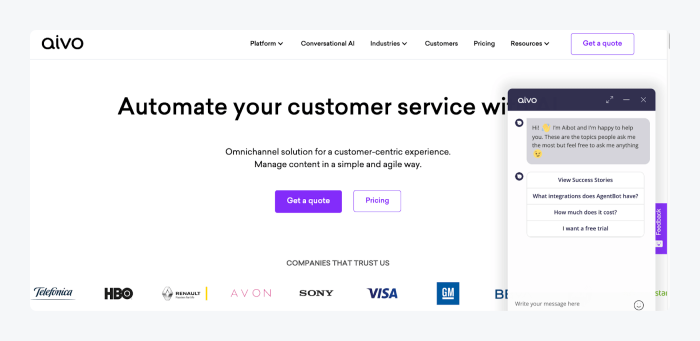
Ratings: 4.5/5 ⭐️ (130+ reviews on G2)
Aivo is one of the best AI platforms that offers multilingual bots for your business. It also lets you personalize the bots just the way you want them.
You can visualize statistics on several dashboards that facilitate the interpretation of the data. It can help you analyze your customers’ responses and improve the bot’s replies in the future.
This chatbot platform offers a unified experience across many channels. You can answer questions coming from web chats, mobile apps, WhatsApp, and Facebook Messenger from one platform. And your AI bot will adapt answers automatically across all the channels for instantaneous and seamless service.
Pros:
- Video content available
- Predictive analytics
- Interactive content available
Cons:
- Difficult to manage the users’ message intents by different team members
Pricing:
- Contact sales team for demo and pricing
6. Dialogflow
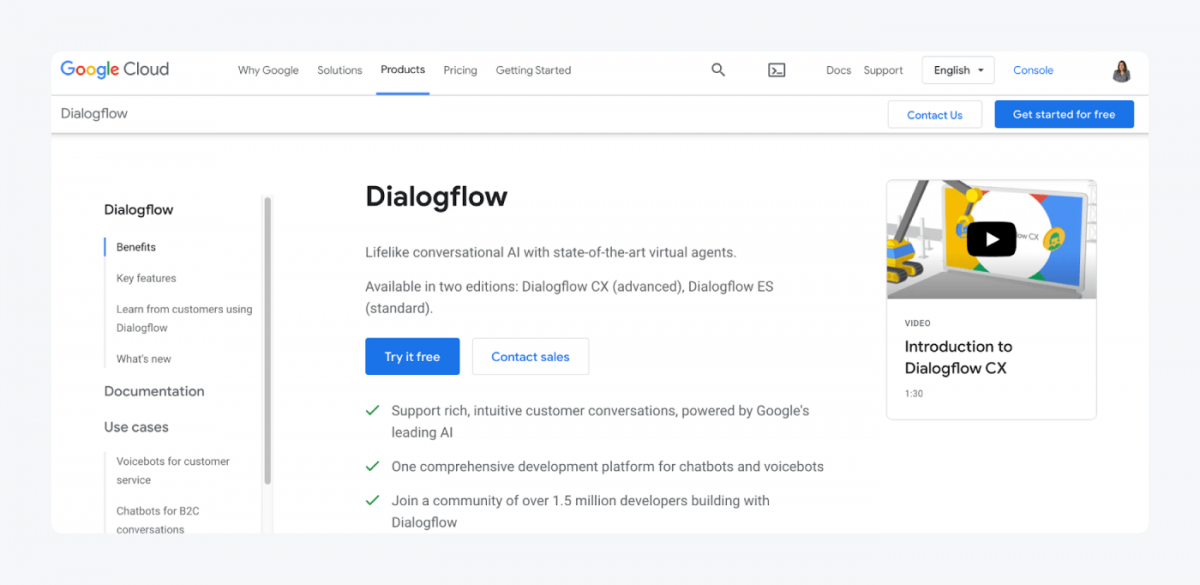
Ratings: 4.4/5 ⭐️ (130+ reviews on G2)
This is a Google AI chatbot platform that uses NLP to create conversational interfaces for websites, apps, IoT devices, and messaging platforms. It is also optimized for Google Assistant for a better user experience.
We don’t recommend using Dialogflow on its own because it is quite difficult to build your bot on it. Instead, you can use other chatbot software to build the bot and then, integrate Dialogflow with it. This will enhance your app by understanding the user intent with Google’s AI.
Pros:
- Google AI
- Voice discussions
- Prebuilt agents for online shopping, food delivery, FAQs, etc.
Cons:
- Difficult to use
- Not a stand-alone product
- Some features still in the beta phase, like customizable environments and multiple versions of agents
Pricing:
- Free trial available
- Text request $0.007/request
- Audio input/output $0.06/min
Read more: Discover what the best finance chatbots are for the financial sector.
7. Imperson
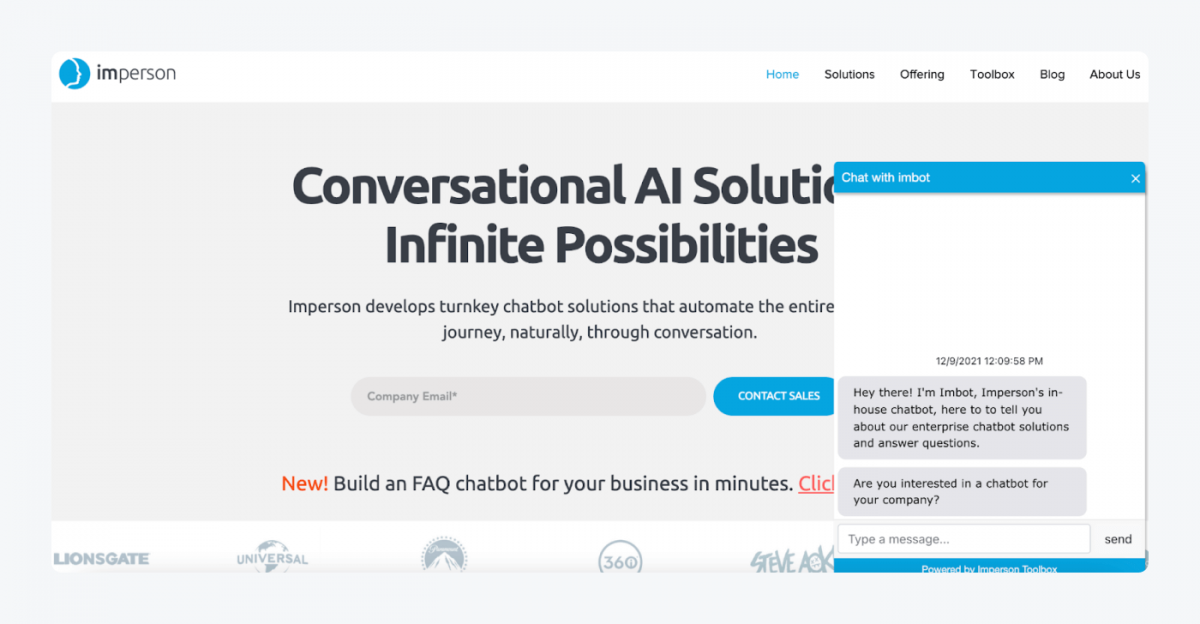
Ratings: no ratings available
Do you want to drive conversion and improve customer relations with your business? If the answer is yes, then this chatbot platform is for you. It will help you engage clients with your company, but it isn’t the best option when you’re looking for a customer support panel.
While this chatbot platform can significantly enhance customer engagement and drive conversions, it might not be the optimal choice for managing customer support inquiries, especially when compared to more robust external drives.
It supports text, audio, video, VR, and AR. This can help you create unique experiences for the client and achieve their goals.
You can also use the advanced analytics dashboard for real-life insights to improve the bot’s performance and your company’s services. It is one of the best chatbot platforms that monitors the bot’s performance and customizes it based on user behavior.
Pros:
- Supports text, audio, video, AR, and VR
- Advanced analytics dashboard
- Deep dialogue context technology
Cons:
- Not designed for general customer service or administrative communication
- Not suitable for smaller to medium businesses
Pricing:
- Price determined individually for each business
8. Octane AI
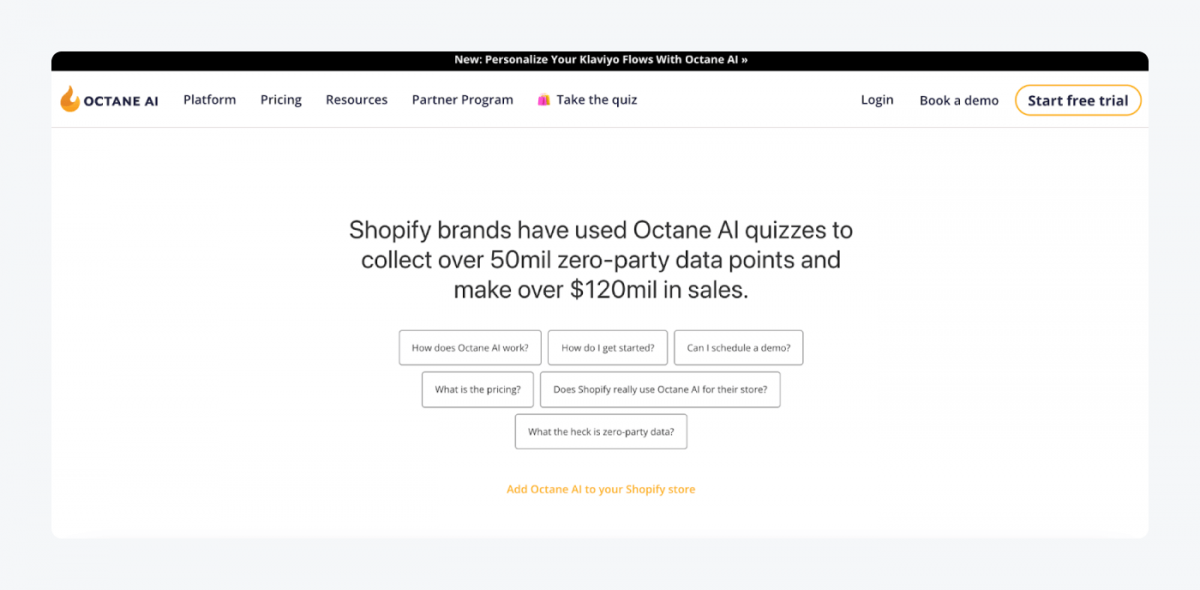
Ratings: 4.2/5 ⭐️ (10+ reviews on G2)
Its Product Recommendation Quiz is used by Shopify on the official Shopify Hardware store. It is also GDPR & CCPA compliant to ensure you provide visitors with choice on their data collection.
Octane AI ecommerce software offers branded, customizable quizzes for Shopify that collect contact information and recommend a set of products or content for customers. This can help you power deeper personalization, improve marketing, and increase conversion rates.
You can include an “Add to cart” button to the pop-up for increased sales. This product is also a great way to power Messenger marketing campaigns for abandoned carts. You can keep track of your performance with detailed analytics available on this AI chatbot platform.
Pros:
- Scheduled messaging
- Survey/poll management
- “Add to cart” button on the pop-up
Cons:
- No custom flows available
Pricing:
- Free 14-day trial available
- Octane ($50/mo)
- Octane plus ($200/mo)
- Enterprise ($500/mo)
9. Genesys DX (formerly Bold360)
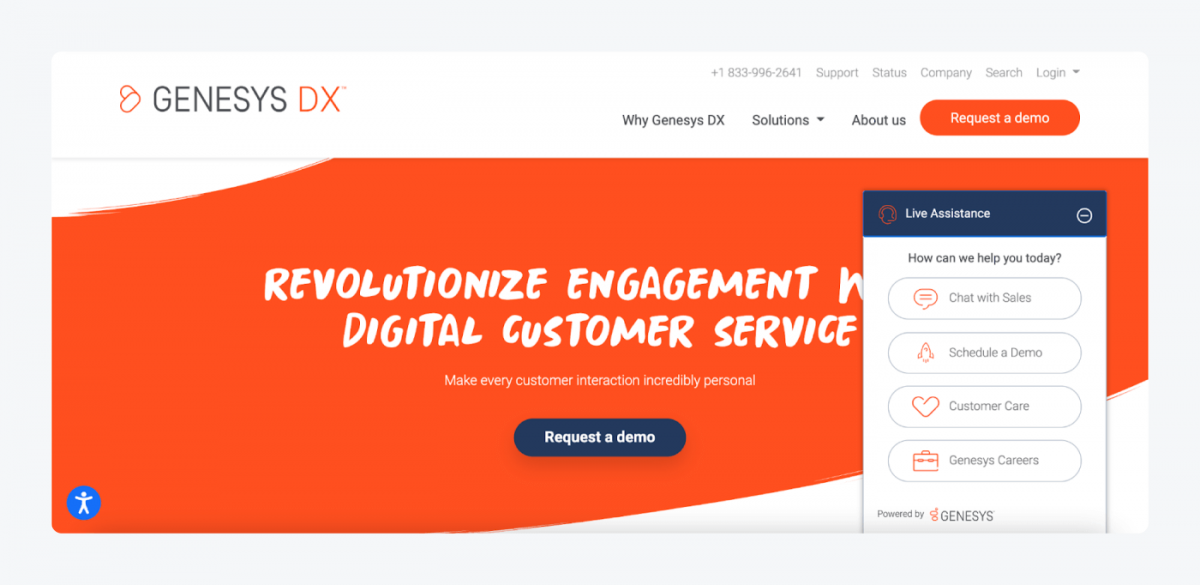
Ratings: 4.4/5 ⭐️ (1,430+ reviews on G2)
This is one of the best AI chatbot platforms that assists the sales and customer support teams. It will give you insights into your customers, their past interactions, orders, etc., so you can make better-informed decisions. The bot also pinpoints areas for improvement and optimization.
You can use the mobile invitations to create mobile-specific rules, customize design, and features. The chatbot platform comes with an SDK tool to put chats on iOS and Android apps.
Genesys DX comes with a dynamic search bar, resource management, knowledge base, and smart routing. This can help you use it to its full potential when making, deploying, and utilizing the bot.
Pros:
- Agent productivity management
- SDK tool to embed chats in iOS and Android apps
- Smart routing
Cons:
- You’ll need to hire a developer to maintain the platform and build out functionalities for your teams
- No real-time analytics on the dashboard
- You can’t make group changes
Pricing:
- Genesys Cloud CX 1 ($75/user/mo)
- Genesys Cloud CX 2 ($115/user/mo)
- Genesys Cloud CX 3 ($155/user/mo)
- Genesys Cloud CX 4 ($240/user/mo)
10. Salesloft (formerly Drift)
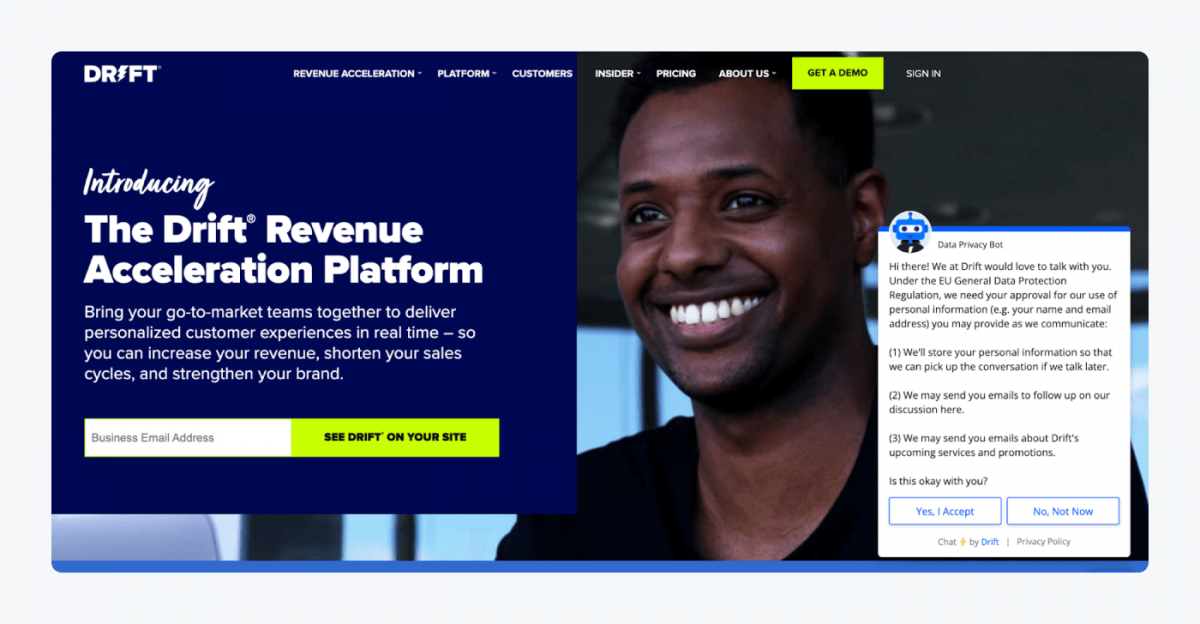
Ratings: 4.4/5 ⭐️ (1,250+ reviews on G2)
Drift is the best AI platform for B2B businesses that can engage customers by conversational marketing.
It offers a live chat, chatbots, and email marketing solution, as well as a video communication tool. You can create multiple inboxes, add internal notes to conversations, and use saved replies for frequently asked questions.
This no-code chatbot platform helps you with qualified lead generation by deploying a bot, asking questions, and automatically passing the lead to the sales team for a follow-up.
Pros:
- Intuitive UI
- Drag-and-drop bot builder
- Account-based marketing (ABM) feature
Cons:
- Limited customization
Pricing:
- Contact sales for pricing and demo
How to choose a chatbot platform?
Choosing a chatbot platform can be overwhelming. After all, you’ve got to wrap your head around not only chatbot apps or builders but also social messaging platforms, chatbot analytics, and Natural Language Processing (NLP) or Machine Learning (ML).
Here’s a cheat sheet you can use to weed through your options.
Identify your business needs and capabilities
Before choosing the best chatbot platform, take the time to assess your business needs and technical capabilities. Ask yourself what goals you want to achieve with the platform and what technical demands you can handle. For example:
- Do I want to use a chatbot to increase sales or automate customer service?
- Do I need advanced AI, ML or will a simple rule-based bot be enough?
- Do I need a bot embedded on a website, mobile app, or social media?
- Does my bot need to integrate with other tools I’m using, e.g., customer retention software?
- Do I have enough technical knowledge and understanding to handle complex platforms?
Determine your budget
Once you’ve got the answers to these questions, compare chatbot platform prices and estimate your budget. Take into account what return on investment you’re looking for. Now, you can simply get rid of the options that don’t fit in it.
Chatbot agencies that develop custom bots for businesses usually drive up your budget, so it might not be a good value for money for smaller businesses.
Consider the pros and cons of your options
Generally speaking, visual UI chatbot builders are the best chatbot platforms for those with no coding skills. Some of them are more intuitive than others, though. Despite usually being low-cost and often free, they can achieve desired outcomes for many businesses.
Bots with advanced functionality can usually deliver ambitious goals. And at the same time, you get complete control over their performance. But highly developed bots require more technical programming skills.
Pick the chatbot provider you can trust
One of the best ways to find a company you can trust is by asking friends for recommendations. The same goes for chatbot providers but instead of asking friends, you can read user reviews. Websites like G2 or Capterra collect software ratings from millions of users. They give you a pretty good understanding of how the company deals with complaints and functionality issues.
Read more: Learn how Lyro successfully handled 70% of support queries and slashed first response times while still in its early stages.
Integrate and monitor your chatbot platform
If you’re using a CMS, like WordPress or Shopify, you can download a plugin or an app through your content management system. Once activated, you’ll have to input your email address and password, but that’s it. You’re set.
The second way is to paste the code snippet for the chatbot platform into your website’s HTML source code. You can find this code in the Settings section in the Installation tab of your provider.
Once you’re set up, you can customize the chat widget, build chat flows, connect your social media, train your AI, and much more.
But remember to also create goals for your chatbots. These will determine its performance. So, decide whether you want it to take care of customer inquiries, sell more, or just engage visitors.
Some of the metrics you could track include:
- Resolution rate
- Conversion rate
- Customer satisfaction score
- Average handling time
- First response rate
Read more: Check out this full tutorial on how to install Tidio on your website. Also, learn the crucial chatbot analytics and KPIs you should be tracking.
Key takeaways
This is the list of 14 powerful chatbot platforms to make a bot for your business:
- Tidio
- MobileMonkey
- Chatfuel
- ManyChat
- Snatchbot
- Aivo
- Dialogflow
- Engati
- Imperson
- Octane AI
- Genesys DX
- Drift chatbot
- Pandorabots
- Wit.ai
Each of the chatbot platforms discussed above is unique and can help you achieve your desired outcomes. But before selecting one there are a couple of points to consider:
- Your business goals—draft the key use case(s) for your bot so that it aligns with your customer needs.
- Customer intent—knowing your customer behavior helps design the bot flow and deliver better customer experience.
- Customer journey—identifying key touchpoints helps you decide which are the right channels to deploy your chatbot.
- Automation—it’s good to know which parts of the customer journey you want to automate, e.g., FAQ, lead generation, support, etc.
Once you know which platform is best for you, remember to follow the best bot design practices to increase its performance and satisfy customers.
FAQ
Tidio is a customer service platform. It offers live chat, chat flows, AI chatbot, and a helpdesk system. A shared inbox brings together your customer communications from email, website, and social media so no interactions slip through the cracks. The software enables businesses to communicate with customers in real time and automate repetitive tasks for the customer support agents.
Yes, Tidio offers AI agents with an average resolution rate of 67%.
Yes, Tidio offers rule-based chat flows as well as AI chatbots.
There are many free platforms available to build and train chatbots but they usually limit the number of subscribers or bot features in their free versions.
Platforms with a free chatbot option or trial include Tidio, MobileMonkey, Chatfuel, ManyChat, and Aivo.
Yes, the Facebook Messenger chatbot uses artificial intelligence (AI) to communicate with people. It is an automated messaging tool integrated into the Messenger app.
It literally takes 5 minutes to install a chatbot on your website. You need to either install a plugin from a marketplace or copy-paste a JavaScript code snippet on your website. Then you can use and/or customize ready-made bot templates. If you decide to build a chatbot from scratch, it would take on average 4 to 6 weeks with all the testing and adding new rules.
